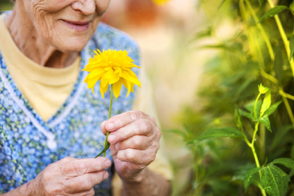There’s something magical about digging your hands into the earth, feeling the sun on your face, and watching life bloom from a tiny seed. For older adults—especially those living with Alzheimer’s and dementia—gardening can offer far more than just beauty. It’s a powerful form of therapy that nurtures the mind, body, and spirit.
Therapeutic gardening, or horticultural therapy, has been shown to improve mood, motor skills, memory, and social connection. But perhaps most importantly, it provides a sense of purpose and peace in the present moment—something everyone deserves, no matter where they are on their journey.
Social Interaction
Gardening in a group setting encourages conversation, laughter, and teamwork. For individuals who may feel isolated or  withdrawn, this shared experience can foster a sense of belonging and reduce loneliness.
withdrawn, this shared experience can foster a sense of belonging and reduce loneliness.
Improved Motor Skills
Simple movements like raking, watering, or planting strengthen fine and gross motor skills. These tasks support physical functioning while promoting independence and confidence.
Elevated Mood
The natural rhythm of gardening—sunshine on your face, hands in the dirt—can be incredibly soothing. Studies have shown that time spent outdoors and interacting with plants can reduce depression, anxiety, and agitation, especially in those with cognitive impairment.
Enhanced Self-Esteem
Tending to a garden offers a sense of accomplishment. Watching something grow because of your care is a powerful reminder that your actions still have meaning.
Memory and Cognitive Engagement
Gardening can spark long-forgotten memories. The smell of lavender, the feel of tomato vines, or the sight of marigolds might bring someone back to their childhood garden. These sensory cues can stimulate memory recall and help individuals stay connected to their past.
A Calming Environment
Gardens provide a peaceful setting away from the noise and demands of daily life. For caregivers, this quiet space can also serve as a much-needed respite, allowing both them and their loved ones to breathe a little easier.
Cultivating Connection
At Mosaic, we encourage families, caregivers, and senior communities to incorporate gardening activities—whether it’s a raised flower bed, a container herb garden, or simply a few pots on a windowsill. Even small interactions with nature can make a big difference.
Therapeutic gardening is not just about growing plants—it’s about growing joy, purpose, and connection. It reminds us that even in the face of memory loss, something beautiful can always take root.

